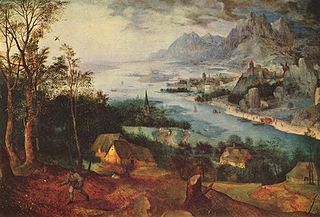
Landscape with the Parable of the Sower – 1557 – Pieter_Bruegel
The kingdom of God is as if a man should scatter seed on the ground. – Mark 4:26
Jesus’ parable about gathering souls to Christ is short, (Mark 4:26-29) but it offers one strong reminder of how souls find their way to Christ. We are the man that scatters the seeds on the ground.
Just like the farmer, we don’t have to know how the seed grows (Mark 4:27) – God will take care of the growth once we plant.
Just like the farmer, we will not see immediate results (Mark 4:28) – we should not get discouraged when there is no growth right away.
Just like the farmer, we gather the harvest as soon as it is ready (Mark 4:29) – our example and encouragement helps bring maturity.
Sowing the seeds of the kingdom is a lot of hard work. It is necessary work though. Just like the farmer cannot expect his field to yield a fine crop without sowing seed, we cannot expect people of the world to come to Christ without an introduction and an invitation.
What can you do today to improve how you scatter seed?
Continue reading...

The Calling of Matthew – 1502 – Vittore Carpaccio (1466–1525)
As Jesus passed on from there, he saw a man called Matthew sitting at the tax booth, and he said to him, “Follow me.” – Matthew 9:9
When Jesus looked at Matthew, he saw the man. He didn’t see the publican, the dregs of society, nor a soul that should be overlooked.
As the beginning of Jesus’ ministry is recorded, we see him taking every opportunity to heal and teach. He doesn’t pick out just the more desirable people. He doesn’t even pick out those he knows would be appreciative or obedient to him afterward.
I realize am making a simple observation based only on my small portion of the world, but Christians probably need to get better at looking beyond the exteriors and seeing the people within. If we are to follow Jesus perfect example, then we need to see every soul as one with the potential to be saved.
There is plenty more that could be said, but I want to plant the idea like a seed to see where others would go with it. The challenge: How can we be better at introducing Christ?
Continue reading...
At first glance, it was not clear to me why the episode of Jesus and the Samaritan woman is included in the gospel. (John 4:1-42) Jesus was tired, hungry and thirsty from traveling. There are no miracles here. People gathered around him wherever he went. Nothing out of the ordinary, if you’re Jesus.
Then I looked at it from the standpoint of the gospel being for all people, in this case, Jew and Gentile. There is still more here than that, though. Looking still deeper, I see standalone instruction on how to bring someone to Christ. It is the ultimate demonstration that God is no respecter of persons.

Giacomo Franceschini – Gesù e la Samaritana al pozzo – 17th or 18th century
The Samaritan woman embodies everything that Christ is not:
- male vs. female
- God vs. man
- wisdom vs. ignorance
- pure vs. immoral
- Jew vs. Gentile
And yet … Jesus reveals to her who he is. Through his love and kindness he convinces her and those in her village that he is Christ. He didn’t even wait until an opportunity came to work it into the conversation. He just started teaching. We see her belief grow from his being a Jew that she is wary of, (John 4:9) to Sir, (John 4:11) to profit, (John 4:19) and finally the Christ. (John 4:29) This realization spread to the others and they desired him to stay with them. Jesus shows us how simple the gospel is. He shows us how so many already have a basic idea of who he is. We only need to lead them the rest of the way. When was the last time you mentioned Jesus in a conversation?
Daily Bible reading for November 8
Psalm 99 2 Kings 8 Zechariah 12-13 John 4:1-42
Continue reading...
Previously we considered the great responsibility of Bible teachers and the powerful position they are in. Depending on their words, they can set the course of another person’s salvation.
Although James 3:1 starts the chapter with a warning to teachers, James 3:18 ends it with the wonderful result of a Bible teachers work: “a harvest of righteousness sown in peace.” Many of us who were raised in the church can remember our Sunday school teachers. I can even remember where I was when I learned some of my Old Testament History: the walls of Jericho, Samson and Delilah, David and Goliath ….
It is the work of those teachers that helped get me where I am now.
It is very challenging to be a teacher, but the greatest challenge may be maintaining a proper attitude. A combination of things from the mood of the class to the ultimate goals of the teacher have an impact on the students. If you read and study James 3:13-18, you see exactly what I mean.
Wisdom born from jealousy and ambition leads down the false path. James spent a lot of time in chapter 3 showing us how powerful the tongue is. Misusing it bears the fruit of disorder and other vile things.
Wisdom born from meekness is “from above” and is demonstrated in good works. Those works look like the seven or eight things listed in James 3:17. Topping that list is purity and peace. Jesus said that the peacemakers will be called the sons of God. (Matthew 5:9)
That, fellow Bible teachers, is why we do it. Despite the warning of stricter judgment, teachers of God’s word are in the highest office offered in this lifetime – they are the peacemakers and therefore the candidates to be God’s children! The next time you have the opportunity to teach a Bible class, take it on knowing the church depends on your work.
Daily Bible reading for October 30
Psalm 90
1 Kings 22:1-40
Zechariah 3
James 3:13-18
Continue reading...
How do we make sense out of James saying that not many should be teachers (James 3:1) and Paul telling everyone to be teachers? (2 Timothy 2:2)
First, since James 3 is all about the tongue and its power, it goes to follow that teachers are going to wield a great deal of influence. As a result, the Bible teacher is going to be judged with some extra scrutiny. (James 3:1b) This is not meant to be a determent from teaching, but a caution to be ready to teach sound doctrine.
Second, being a teacher might have been one of the ways church members used to gain honor. In 1 Corinthians 12:28, we see that teachers were ranked third on the list before miracles and right after prophets. In the worship style of the first century (1 Corinthians 14:26-40) A number of people might stand up to talk and teach. Some might have tried to take on the honor of teaching when they were not ready.
Since there are no more apostles, prophets or miracles, we are left with teachers of the word. It is an office that needs to be taken on with great care and reverence. Being a teacher isn’t always right for everyone at a given time, but it is an honor and a requirement that we should all seek.
Teachers: Strive always to use right words and wise warnings (Proverbs 25:11-12)
Daily Bible reading for October 29
Psalm 89
1 Kings 21
Zechariah 1:18-2:13
James 3:1-12
Continue reading...











February 20, 2014
Comments Off on Wanted: Seed Scatterers